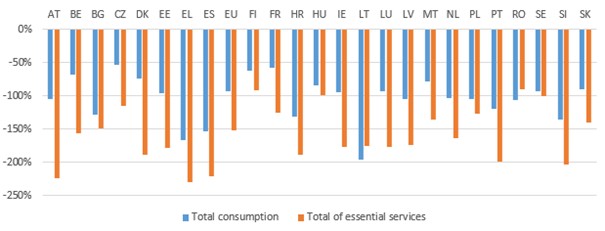Access to essential services in the EU: key challenges for the most vulnerable

Gilberto Pelosi
Access to water, sanitation, energy, transport, financial services and digital communications is essential to meet basic human needs to live and participate in society. Moreover, such services facilitate access to other important services, including early childhood education and care, training and education, healthcare, long-term care and social inclusion services.
This is why the European Pillar of Social Rights (EPSR) dedicates its 20 principles to these services, defined as essential. The notion of "essential services" is not part of the EU acquis, which refers instead to services of general interest. These are services that public authorities of the EU Member States classify as being of general interest and are therefore subject to specific public service obligations.
Households at risk of poverty or social exclusion tend to spend around 60% more of their budget on essential services, which makes price increases a significant factor that can make essential services difficult to afford.
Article 14 of the Treaty on the Functioning of the European Union and Protocol 26 of the Treaty on European Union specify the shared principles that guide the Union's action in this field: quality, safety, affordability, equal treatment, and the promotion of universal access and users' rights. These aspects are taken up by the EPSR's 20 principles, which reiterates the importance of universal access, encompassing the affordability of services, their availability (within a reasonable distance) and their accessibility (physical and through ICTs), and underlines the necessity to support people in need.
Member States recognise the "essential" nature of certain services in different ways, for example, through provisions indicating a minimum supply of services (e.g. a minimum internet speed available to all) or the necessity to ensure the continuity of the service in the social interest (e.g. bans on disconnection from energy, water and sanitation services, or measures ensuring the existence of suppliers of last resort).
Despite these provisions, significant barriers still make it difficult for some people in the EU to access these services. To assess the situation, the European Commission released the first-ever Report on Access to Essential Services in the EU, in 2023. According to the report, people at risk of poverty or social exclusion, as well as the most marginalised, face the greatest barriers in accessing such services.
Affordability generally constitutes the most important barrier. Households at risk of poverty or social exclusion tend to spend around 60% more of their budget on essential services, which makes price increases a significant factor that can make essential services difficult to afford.
Affordability issues are greatest for energy, followed by digital communications, transport, and water and sanitation: 9.3% of the EU population cannot keep their homes adequately warm, 2.4% cannot afford an internet connection at home, 2.4% cannot afford regular use of public transport, and 1.5% live in households without a bath, shower or flushing toilet, with considerable variations between Member States. Being at risk of poverty and belonging to a disadvantaged group, including homeless people and marginalised communities such as Roma, increase the risk of being unable to afford essential services.
Inability to keep home adequately warm rate for EU-27, 2015-2022 (%)
Availability and accessibility also pose challenges to access, sometimes linked to other barriers, such as lack of skills or geographical factors (notably the urban-rural divide). The lack of infrastructure or gaps in availability relate mainly to water and sanitation for specific territories and marginalised communities, such as Roma.
Living in rural areas or remote regions usually implies access to fewer transport services and a lower quality of broadband services.
The territorial dimension also strongly affects the availability of transport and digital communications, since living in rural areas or remote regions usually implies access to fewer transport services and a lower quality of broadband services. Physical and online accessibility is mostly a concern regarding transport, financial services and digital communications, and particularly affects persons with disabilities and older people. Low skills and insufficient knowledge are a barrier specific to digital communications and financial services, which limits opportunities for labour market participation and integration in society. Access to essential services also usually requires a fixed address, which represents a specific barrier for homeless people.

//images from Report on Access to Essential Services in the EU
Differences between median expenditure share for households in the first and last income deciles, by Member State and EU, 2015 (%)
The report also outlines existing support measures in different EU countries, with a particular focus on social policy measures. For example, in many countries minimum income schemes help make sure that people without sufficient resources have effective access to the goods and services they need.
For its part, the EU also supports access to essential services through its various funds (e.g. European Social Funds+, European Regional Development Funds, Recovery Resilience Facility), as well as through targeted legislation, universal/public service obligations and measures to protect consumers.
The EU has committed to lift at least 15 million people out of poverty by 2030. The cost-of-living crisis has put the issue of access to essential services at the centre of public concerns and political debate. At the same time, longer-term dynamics, such as demographic change and the green and digital transitions, are also affecting access to and demand of these services.
With the European Pillar of Social Rights, the EU has placed essential services at the core of its broader commitment to fighting poverty, inequality and social exclusion. Supporting access for the most vulnerable will be instrumental to achieve the 2030 poverty reduction target.
Gilberto Pelosi, Policy Officer, European Commission